Rekindling the Flames of Discontent
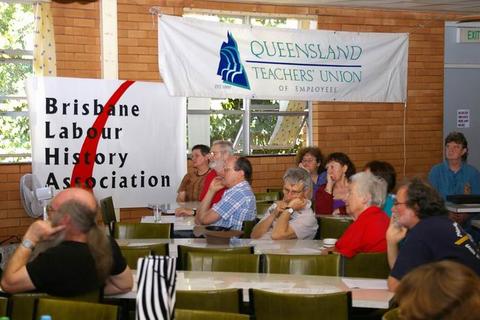 Conference and Concert
Conference and Concert
23 September 2006
Article by Jan Nary
Photography
courtesy Ted Riethmuller
Named after an album issued in 1979 by The Seamen’s Union of Australia during the Utah Dispute, this one-day event was organised by the Brisbane Labour History Association to celebrate the links between the labour movement and folk music. Held in the East Brisbane Bowls Club, it combined an afternoon conference and an evening concert and attracted close to ninety participants. The stage setting for the day was the stunning "Flames of Discontent" silk backdrop hand-crafted by Annette Hood.
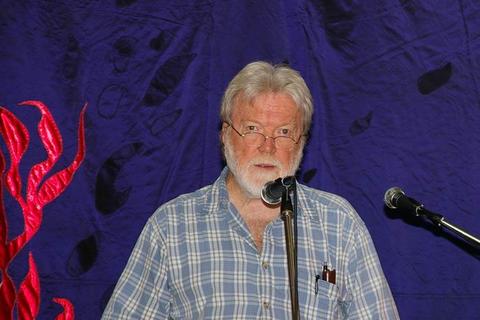 Dr Robert V. Anderson OAM (Uncle Bob),
an Elder of the Ngugi people, gave the Welcome to Country on behalf of the
traditional landowners, the Coorparoo clan
of the Jagera nation. A former ships painter and docker and Building Workers
Industrial Union organizer, he recalled parts of this youth spent in the
area and some of the local working class history. He shared memories of jogging
down from his mother’s house to the saltwater baths at the north end
of Mowbray Park and the band playing in the rotunda on Sundays; of the nearby
Forsythe’s
Rope Works, where the rope making shed stretched for nearly two residential
blocks, and of the "green hat" raffles, (held for the local maritime
branch of the Communist Party of Australia) named after the hat the tickets
were
drawn from in the local pub, The Shafston.
Dr Robert V. Anderson OAM (Uncle Bob),
an Elder of the Ngugi people, gave the Welcome to Country on behalf of the
traditional landowners, the Coorparoo clan
of the Jagera nation. A former ships painter and docker and Building Workers
Industrial Union organizer, he recalled parts of this youth spent in the
area and some of the local working class history. He shared memories of jogging
down from his mother’s house to the saltwater baths at the north end
of Mowbray Park and the band playing in the rotunda on Sundays; of the nearby
Forsythe’s
Rope Works, where the rope making shed stretched for nearly two residential
blocks, and of the "green hat" raffles, (held for the local maritime
branch of the Communist Party of Australia) named after the hat the tickets
were
drawn from in the local pub, The Shafston.
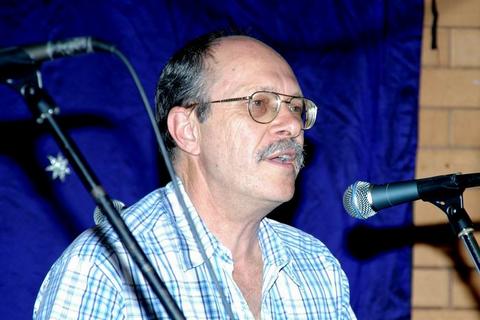 Greg Mallory, President of the
BLHA, opened proceedings with observations on the fading trade union presence
in some big folk festivals, citing the
CFMEU’s
continuing support of the National Folk Festival as an encouraging and natural
liaison. The need to reunite the festival and trade union movements was a
topic explored at length in the forum held later in the afternoon, chaired
by Senator
Claire Moore.
Greg Mallory, President of the
BLHA, opened proceedings with observations on the fading trade union presence
in some big folk festivals, citing the
CFMEU’s
continuing support of the National Folk Festival as an encouraging and natural
liaison. The need to reunite the festival and trade union movements was a
topic explored at length in the forum held later in the afternoon, chaired
by Senator
Claire Moore.
Doug Eaton gave the first presentation of the afternoon, a fascinating, first-hand insight into the life, work and times of John Manifold. Communist, poet, writer, singer, bush instrument maker, folk song collector and founder of Bandicoots (the Manifold family band plus friends-including Doug), Manifold was Cambridge educated and had worked for some time in Africa, remarking that "all we gave Africa was corrugated iron, bully beef and syphilis".
Ross Gwyther from the NTEU (National Tertiary Education Union), spoke of his lifelong interest in working people’s music, how it reflected and grew out of working class struggle. He recounted a nighttime demonstration against a railway shipment of uranium yellowcake. Knowing that they couldn’t halt the shipment the handful of protestors were feeling defeated until Geoff Wills started singing "We Shall Overcome". The group took up the song and suddenly there was a new meaning and energy rekindled as the power of song was writ large in their hearts
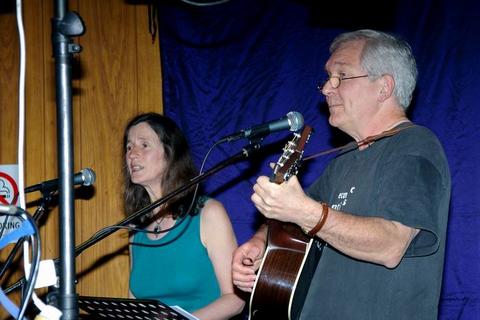 Bob and Margaret Fagan spoke of the Realist Writers
of Sydney and its publication The Realist Writer (later The Realist). With
John Manifold as editor, the publication
attracted some of the great left-wing writers of the day, including Judah
Waten, Helen Palmer, Dorothy Hewett and Merv Lilley. Bob and Margaret spoke
of poems
that had become songs, often being set to traditional tunes, and gave stirring
renditions of a selection that included two poems by Dorothy Hewett; "Norman
Brown" (to the tune of "Collier Laddie"), "Where I Grew
to Be a Man" (commonly known as "Weevils in the Flour") both
of which are often mistakenly attributed as traditional songs. They closed
with Denis Kevans' tribute to the Green Bans, "Monuments",
to which Bob wrote the tune.
Bob and Margaret Fagan spoke of the Realist Writers
of Sydney and its publication The Realist Writer (later The Realist). With
John Manifold as editor, the publication
attracted some of the great left-wing writers of the day, including Judah
Waten, Helen Palmer, Dorothy Hewett and Merv Lilley. Bob and Margaret spoke
of poems
that had become songs, often being set to traditional tunes, and gave stirring
renditions of a selection that included two poems by Dorothy Hewett; "Norman
Brown" (to the tune of "Collier Laddie"), "Where I Grew
to Be a Man" (commonly known as "Weevils in the Flour") both
of which are often mistakenly attributed as traditional songs. They closed
with Denis Kevans' tribute to the Green Bans, "Monuments",
to which Bob wrote the tune.
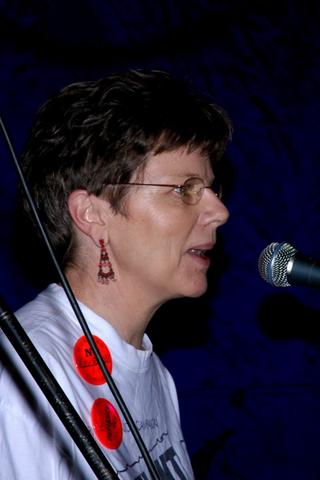 Another member of the NTEU and BLHA committee member,
Janis Bailey, gave a
talk on researching unions and shared some personal anecdotes. She introduced
Bernard
Carney’s "Stand Together" (sadly, only on CD)! then Mark
Gregory took the floor to talk about collecting and disseminating music about
working
class struggle.
Another member of the NTEU and BLHA committee member,
Janis Bailey, gave a
talk on researching unions and shared some personal anecdotes. She introduced
Bernard
Carney’s "Stand Together" (sadly, only on CD)! then Mark
Gregory took the floor to talk about collecting and disseminating music about
working
class struggle.
Mark is working on a Masters Degree called "Sixty years
of Australian Union Songs" based on his research for the MUA centenary
CD "With
These Arms" and
the growing collection of songs and poems on his Union Songs website (unionsong.com).
Describing himself as "a hunter of union songs", Mark shared the
work from the books and writers he has unearthed in his research. One of
these was
the almost unknown wharfie poet Ernest Antony who published his "The
Hungry Mile and other poems" in Sydney in 1930. Another was the miners'
poet Jock Graham. He cited the work of poet and writer Bartlett Adamson,
author
of a collection
called "Peace and Friendship", whose work inspired Denis Kevans
in his large number of four line poems, and spoke of the contribution to
the folk
canon of the 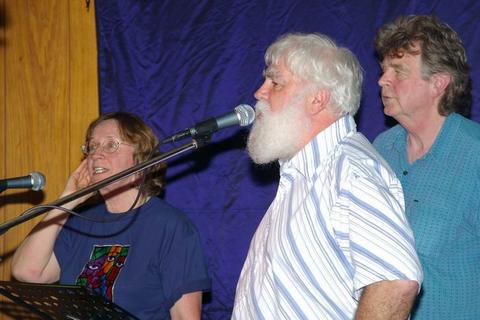 IWW (Industrial Workers of the World - the "wobblies").
The hard-hitting poetry generated by the end of the Second World War was
illustrated through the Dorothy Hewett and Merv Lilley collection "What
About the People" published
in Brisbane in 1963. Mark's long interest in union songs was reignited by
the plethora of songs and poems that flooded into his Union Songs collection
during
the Patrick Dispute in 1998. He also spoke of the difficulty in having working
class poems and songs published, since those who control publications also
control what they deem "worthy" of our attention, still affected
it seems by the Cold War amnesia that refused to regard political poetry
and song as
worthy
of study.
IWW (Industrial Workers of the World - the "wobblies").
The hard-hitting poetry generated by the end of the Second World War was
illustrated through the Dorothy Hewett and Merv Lilley collection "What
About the People" published
in Brisbane in 1963. Mark's long interest in union songs was reignited by
the plethora of songs and poems that flooded into his Union Songs collection
during
the Patrick Dispute in 1998. He also spoke of the difficulty in having working
class poems and songs published, since those who control publications also
control what they deem "worthy" of our attention, still affected
it seems by the Cold War amnesia that refused to regard political poetry
and song as
worthy
of study.
Margaret Walters and John Warner sang a song written by John which powerfully evoked the atmosphere of the picket line at Penhryn Road during the 1998 MUA struggle, and the whole conference joined in the stirring chorus of "MUA - here to stay!" They then presented another song of John's set to an old hymn tune – "Bring Out the Banners". A straightforward and irresistible song, it bears all the hallmarks of John Warner’s genius; using just the right words and just enough of them. Powerfully and irrefragably honest, passionate and exquisitely singable it could well become the working class anthem of this age, a much-needed call to arms – and hope – for a disenfranchised and wounded working class.
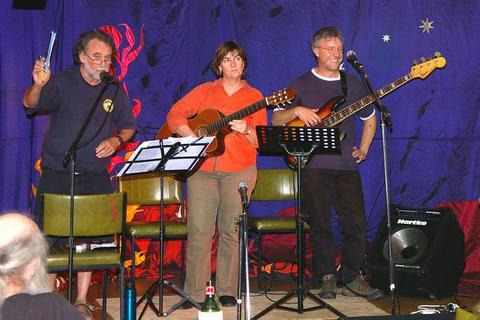 Sue Monk and Lachlan Hurse spoke
of the songs of Latin America that had come out of working class experiences.
They had everyone singing along to the classic
Cuban song "Guantanamera", with Cuban Jose Marti’s words
set to music by Joseito Fernandez, and recorded and popularised by Pete Seeger
during
the Cuban missile crisis. They spoke of the wave of "new song" movement
that swelled through Chile after the election of Allende in 1970, the collecting
of songs from workers and peasants all over the country that generated a
new form of national music. They spoke of the national singer / songwriter
Victor
Jara, who was arrested and had his fingers broken so that he could not play
again. They recalled the military coup and bombing of the President’s
Palace in 1973 and the diaspora of Chilean musicians in exile, who brought
to Australia
their songs and their stories of the outrages. The ACTU placed a trade union
ban on loading Chilean ships and while the political scene has now shifted
the
music of Latin America has won a permanent place in Australia.
Sue Monk and Lachlan Hurse spoke
of the songs of Latin America that had come out of working class experiences.
They had everyone singing along to the classic
Cuban song "Guantanamera", with Cuban Jose Marti’s words
set to music by Joseito Fernandez, and recorded and popularised by Pete Seeger
during
the Cuban missile crisis. They spoke of the wave of "new song" movement
that swelled through Chile after the election of Allende in 1970, the collecting
of songs from workers and peasants all over the country that generated a
new form of national music. They spoke of the national singer / songwriter
Victor
Jara, who was arrested and had his fingers broken so that he could not play
again. They recalled the military coup and bombing of the President’s
Palace in 1973 and the diaspora of Chilean musicians in exile, who brought
to Australia
their songs and their stories of the outrages. The ACTU placed a trade union
ban on loading Chilean ships and while the political scene has now shifted
the
music of Latin America has won a permanent place in Australia.
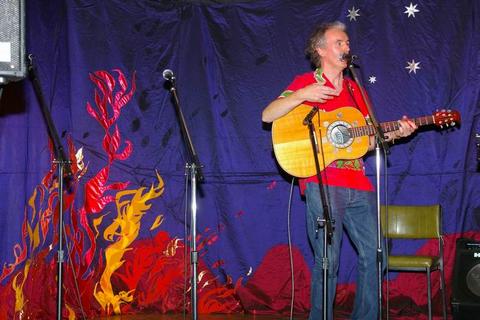 The conference
then moved into a forum where the only thing missing was time. The forum
discussed ways and means of getting people singing again, at rallies,
marches and trade union gatherings; the need for trade unions to access more
grass roots singers for meetings; striking the balance between booking big-name
drawcards for political events and booking working class performers who sing
from conviction born of experience; the creation of an e-list of folk who
would be happy to turn up and sing at trade union gatherings; the vital role
played
by the trade union choirs and the need for folk festivals to nurture the
links between music and working class movements.
The conference
then moved into a forum where the only thing missing was time. The forum
discussed ways and means of getting people singing again, at rallies,
marches and trade union gatherings; the need for trade unions to access more
grass roots singers for meetings; striking the balance between booking big-name
drawcards for political events and booking working class performers who sing
from conviction born of experience; the creation of an e-list of folk who
would be happy to turn up and sing at trade union gatherings; the vital role
played
by the trade union choirs and the need for folk festivals to nurture the
links between music and working class movements.
Absolutely Scandalous performed during dinner and the following evening concert featured Jumping Fences, Margaret Walters and John Warner, Mark Gregory, Jack Mancour, Tommy Leonard, Doug Eaton, Combined Unions Choir, Bob and Margaret Fagan and Sonia Bennett. Writer and activist David Peetz, from Absolutely Scandalous, also compered the concert.
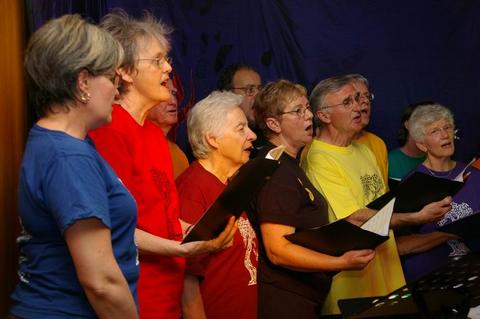 A strong feeling came from the day that this should
be done again as soon as humanly possible, and that other States might consider
similar initiatives.
Organisers, in particular Dale Jacobsen, are to be congratulated for identifying
and addressing
the real need to weave our working class cultures and organisations back
together.
As John Warner succinctly put it; "You can encapsulate things in a song
in a more powerful and emotional way that in a speech. Whether your singing
is good or bad we need to sing together – there’s a cumulative
power in the sheer weight of music created by people singing in a group,
reinforcing
each other. Sometimes people out there don’t want to hear what our
song says but we need to hear it."
A strong feeling came from the day that this should
be done again as soon as humanly possible, and that other States might consider
similar initiatives.
Organisers, in particular Dale Jacobsen, are to be congratulated for identifying
and addressing
the real need to weave our working class cultures and organisations back
together.
As John Warner succinctly put it; "You can encapsulate things in a song
in a more powerful and emotional way that in a speech. Whether your singing
is good or bad we need to sing together – there’s a cumulative
power in the sheer weight of music created by people singing in a group,
reinforcing
each other. Sometimes people out there don’t want to hear what our
song says but we need to hear it."